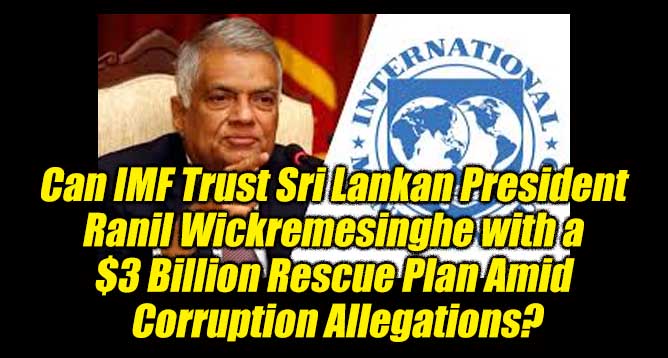-By A Staff Writer

(Lanka-e-News -11.June.2024, 11.40 PM) As Sri Lanka grapples with a severe economic crisis, the International Monetary Fund (IMF) is considering a $3 billion rescue plan to stabilize the country. However, the IMF faces a significant dilemma: can it trust President Ranil Wickremesinghe, who has been previously accused of involvement in a major corruption scandal?
In 2015, Wickremesinghe was implicated in an insider trading scam at the Sri Lankan Central Bank. Although he has consistently maintained his innocence, the scandal, known as "The Bond Scandal," has left a lasting stain on his reputation. The controversy erupted shortly after Wickremesinghe was sworn in as prime minister following the election defeat of President Mahinda Rajapaksa. The opposition had rallied behind Wickremesinghe as a unity candidate, hoping to usher in a new era of good governance.
The scandal's credibility was fueled by the involvement of Arjuna Mahendran, Wickremesinghe’s school friend and his choice for the position of Central Bank Governor. Mahendran was at the center of the scam, which further tarnished Wickremesinghe's image and shook the confidence of international investors in Sri Lanka.
Reports from 2015 indicate that despite Wickremesinghe and other senior officials appearing before a commission of inquiry, foreign investors remained skeptical about Sri Lanka's governance. The commission, appointed by then-President Maithripala Sirisena, investigated the bond sale after opposition lawmakers demanded an independent inquiry. The opposition claimed that the bond issue had increased government borrowing costs by over $1 billion in two years, a significant burden for a country with just $7 billion in foreign currency reserves and over $5 billion in payments due starting in 2019.
According to Nikkei Asia, the Central Bank decided in late February 2015 to raise 10 billion rupees through the sale of 30-year government bonds at a fixed interest rate of 12.5%. Initially, the bank had announced an offer of 1 billion rupees with a 9.5% fixed interest rate. Perpetual Treasuries Limited, owned by Arjun Aloysius, the son-in-law of then-Governor Arjuna Mahendran, acquired bonds worth 7 billion rupees. The conflict of interest was evident, given Mahendran’s close ties with Wickremesinghe.
Despite denials from all accused parties, the scandal underscored the deep nexus between capital and politics in Sri Lanka. Witnesses before the Bond Commission highlighted the involvement of the country’s elite in questionable financial practices. Although Mahendran resigned in 2016 and was found "directly responsible" after an 18-month parliamentary probe, Wickremesinghe managed to maintain his political standing.
The resurfacing of the bond scandal raises questions about Wickremesinghe’s credibility to implement the IMF rescue plan effectively. Critics argue that Wickremesinghe might use the IMF plan to rehabilitate his image, while potentially benefiting his close associates through the privatization of state enterprises and other questionable transactions.
The IMF's decision to entrust such a significant sum to Wickremesinghe's administration is fraught with risk, given the past allegations. The success of the rescue plan depends not only on sound economic policies but also on the integrity and transparency of the government implementing them.
As Sri Lanka awaits the IMF's decision, the question remains: can the international community place its trust in a leader with a tainted past to steer the country towards economic recovery?
---------------------------
by (2024-06-11 19:38:04)
Leave a Reply